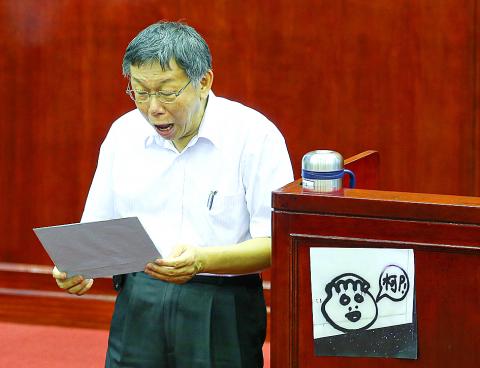Taipei Mayor Ko Wen-je (柯文哲) yesterday criticized the implementation of China’s “one country, two systems” formula in Hong Kong and urged Taiwanese to work together to protect the nation.
“Even beggars would run away” if the formula were implemented in Taiwan in the same manner as it is being executed in Hong Kong, Ko said during a question-and-answer session at the Taipei City Council.
Democratic Progressive Party (DPP) Taipei City Councilor Chiang Chih-ming (江志銘) said that President Tsai Ing-wen (蔡英文) and former premier William Lai (賴清德), who have registered as candidates for the DPP’s presidential primary, have both promised to “protect the nation.”

Photo: CNA
It is speculated that Ko will announce a presidential bid, Chiang said and asked him to clarify his stance on protecting Taiwan.
“Even a beggar should protect Taiwan, not only the president, because protecting Taiwan is everyone’s responsibility,” Ko said.
Chiang said the Chinese Nationalist Party’s (KMT) potential presidential candidates have expressed their opinions about the “one country, two systems” framework and the so-called “1992 consensus,” and asked the mayor to explain his views.
Ko said the terms have become mere labels in Taiwan and that no one understands what the “1992 consensus” really means.
“If the ‘one country, two systems’ formula [intended for Taiwan] is like the ‘Hong Kong model,’ then everyone would run away,” he said, adding that China has to explain what it means.
DPP Taipei City Councilor Chen Yi-chun (陳怡君) asked Ko to comment on Chinese Minister of National Defense General Wei Fenghe’s (魏鳳和) remark on Sunday that the Chinese military would fight at all costs if anyone dared to “split Taiwan from China” and that the Tiananmen Square Massacre 30 years ago was the “correct” decision to ensure stability.
The massacre is “a tragedy in China’s modern history involving Chinese killing Chinese,” Ko said, adding: “We need to strengthen our national defense, because the more Wei speaks about it, the more Taiwanese are afraid.”
The “1992 consensus,” a term former Mainland Affairs Council chairman Su Chi (蘇起) in 2006 admitted making up in 2000, refers to a tacit understanding between the KMT and the Chinese government that both sides of the Strait acknowledge there is “one China,” with each side having its own interpretation of what “China” means.

Chinese spouse and influencer Guan Guan’s (關關) residency permit has been revoked for repeatedly posting pro-China videos that threaten national security, the National Immigration Agency confirmed today. Guan Guan has said many controversial statements in her videos posted to Douyin (抖音), including “the red flag will soon be painted all over Taiwan” and “Taiwan is an inseparable part of China,” and expressing hope for expedited reunification. The agency last year received multiple reports alleging that Guan Guan had advocated for armed reunification. After verifying the reports, the agency last month issued a notice requiring her to appear and explain her actions. Guan

GIVE AND TAKE: Blood demand continues to rise each year, while fewer young donors are available due to the nation’s falling birthrate, a doctor said Blood donors can redeem points earned from donations to obtain limited edition Formosan black bear travel mugs, the Kaohsiung Blood Center said yesterday, as it announced a goal of stocking 20,000 units of blood prior to the Lunar New Year. The last month of the lunar year is National Blood Donation Month, when local centers seek to stockpile blood for use during the Lunar New Year holiday. The blood demand in southern Taiwan — including Tainan and Kaohsiung, as well as Chiayi, Pingtung, Penghu and Taitung counties — is about 2,000 units per day, the center said. The donation campaign aims to boost

The Kaohsiung Tourism Bureau audited six hotels in an effort to prevent price gouging ahead of Korean band BTS’ concert tour in the city scheduled for Nov. 19, 21 and 22 this year. The bureau on Friday said that the audits — conducted in response to allegations of unfair pricing posted on social media — found no wrongdoing. These establishments included the local branches of Chateau de Chine, Hotel Nikko, My Humble House, and Grand Hai Lai, it said, adding that the Consumer Protection Commission would have penalized price gougers had the accusations been substantiated. The bureau said the Tourism Development Act

BACK TO WINTER: A strong continental cold air mass would move south on Tuesday next week, bringing colder temperatures to northern and central Taiwan A tropical depression east of the Philippines could soon be upgraded to be the first tropical storm of this year, the Central Weather Administration (CWA) said yesterday, adding that the next cold air mass is forecast to arrive on Monday next week. CWA forecaster Cheng Jie-ren (鄭傑仁) said the first tropical depression of this year is over waters east of the Philippines, about 1,867km southeast of Oluanpi (鵝鑾鼻), and could strengthen into Tropical Storm Nokaen by early today. The system is moving slowly from northwest to north, and is expected to remain east of the Philippines with little chance of affecting Taiwan,